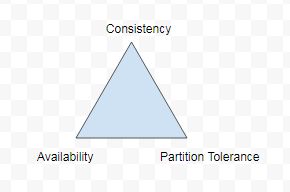Guarantees
Apache Cassandra is a highly scalable and reliable database. Cassandra is used in web-based applications that serve large number of clients and the quantity of data processed is web-scale (Petabyte) large. Cassandra makes some guarantees about its scalability, availability and reliability. To fully understand the inherent limitations of a storage system in an environment in which a certain level of network partition failure is to be expected and taken into account when designing the system, it is important to first briefly introduce the CAP theorem.
What is CAP?
According to the CAP theorem, it is not possible for a distributed data store to provide more than two of the following guarantees simultaneously.
-
Consistency: Consistency implies that every read receives the most recent write or errors out
-
Availability: Availability implies that every request receives a response. It is not guaranteed that the response contains the most recent write or data.
-
Partition tolerance: Partition tolerance refers to the tolerance of a storage system to failure of a network partition. Even if some of the messages are dropped or delayed the system continues to operate.
The CAP theorem implies that when using a network partition, with the inherent risk of partition failure, one has to choose between consistency and availability and both cannot be guaranteed at the same time. CAP theorem is illustrated in Figure 1.

High availability is a priority in web-based applications and to this objective Cassandra chooses Availability and Partition Tolerance from the CAP guarantees, compromising on data Consistency to some extent.
Cassandra makes the following guarantees.
-
High Scalability
-
High Availability
-
Durability
-
Eventual Consistency of writes to a single table
-
Lightweight transactions with linearizable consistency
-
Batched writes across multiple tables are guaranteed to succeed completely or not at all
-
Secondary indexes are guaranteed to be consistent with their local replicas' data
High Scalability
Cassandra is a highly scalable storage system in which nodes may be added/removed as needed. Using gossip-based protocol, a unified and consistent membership list is kept at each node.
High Availability
Cassandra guarantees high availability of data by implementing a fault-tolerant storage system. Failure of a node is detected using a gossip-based protocol.
Durability
Cassandra guarantees data durability by using replicas. Replicas are multiple copies of a data stored on different nodes in a cluster. In a multi-datacenter environment the replicas may be stored on different datacenters. If one replica is lost due to unrecoverable node/datacenter failure, the data is not completely lost, as replicas are still available.
Eventual Consistency
Meeting the requirements of performance, reliability, scalability and high availability in production, Cassandra is an eventually consistent storage system. Eventually consistency implies that all updates reach all replicas eventually. Divergent versions of the same data may exist temporarily, but they are eventually reconciled to a consistent state. Eventual consistency is a tradeoff to achieve high availability, and it involves some read and write latencies.
Lightweight transactions with linearizable consistency
Data must be read and written in a sequential order. The Paxos consensus protocol is used to implement lightweight transactions. The Paxos protocol implements lightweight transactions that are able to handle concurrent operations using linearizable consistency. Linearizable consistency is sequential consistency with real-time constraints, and it ensures transaction isolation with compare-and-set (CAS) transactions. With CAS replica data is compared and data that is found to be out of date is set to the most consistent value. Reads with linearizable consistency allow reading the current state of the data, which may possibly be uncommitted, without making a new addition or update.
Batched Writes
The guarantee for batched writes across multiple tables is that they will eventually succeed, or none will. Batch data is first written to batchlog system data, and when the batch data has been successfully stored in the cluster, the batchlog data is removed. The batch is replicated to another node to ensure that the full batch completes in the event if coordinator node fails.














